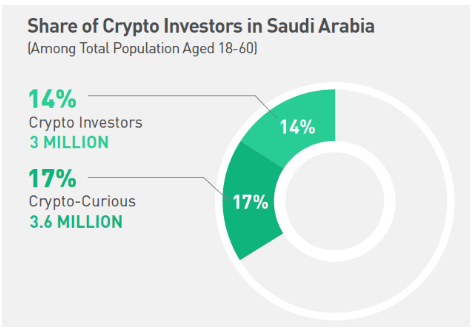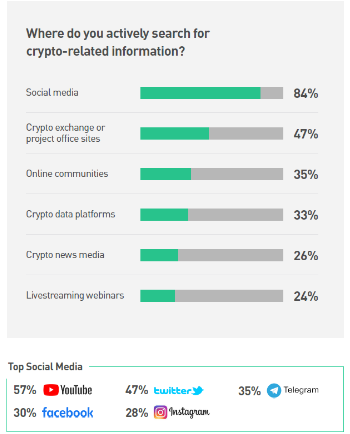About 14% of Saudi residents are either current crypto investors or have traded crypto in the past six months, the latest Kucoin study has found. The study has also found that 76% of investors have less than one year of experience and thus may be in need of relevant crypto education.
Crypto Winter Effect
Around three million Saudi Arabians, or about 14% of the adult population aged 18 to 60, are either crypto investors or have traded crypto over the last six months, the latest study conducted by the cryptocurrency exchange Kucoin has shown. The study findings also suggested that a further 17% of the country’s adults are said to be “crypto-curious and are likely to invest in cryptocurrencies over the coming six months.”
According to the crypto exchange’s Into The Cryptoverse report, the study also looked at how Saudi residents’ sentiment toward crypto trading has shifted since the onset of the ongoing crypto winter.
“In the first quarter of 2022, 49% of crypto investors intended to increase investment in cryptocurrencies over the coming six months. The onset of the bearish market in the second quarter of 2022 saw a reversal of investor sentiment toward more conservative strategies related to the holding of cryptocurrencies,” the report noted.

The report added that since the start of Q2, some 31% of crypto owners in the country have signaled a desire to “keep their crypto balance as is rather than increase their investment.” In contrast, investors with lower incomes have tended to liquidate part of their portfolios during the same period.
Crypto the Future of Finance
Meanwhile, Kucoin said it found that 76% of the investors have less than one year of experience. About 49% of these investors have only started crypto trading or investing in crypto in the past six months. According to the report, Saudi Arabia’s high proportion of newbies points to the need for crypto education.
With respect to their reasons for investing, some 51% of Saudi crypto investors said they are in this business because “they believe it is the future of finance.” About 44% said they are investing in cryptocurrencies because they “can bring them higher returns in the long run compared to other types of financial investment.”
While men were found to be the most dominant gender group (63%), young investors aged 30 and below are now thought to account for at least a third of the total. While 44% of male crypto investors said they would not want to miss the trend, the study observed that women are more focused on the realistic benefits of crypto.

In terms of sources of information, the report said “84% of crypto investors turn to [social media] when doing their research, particularly YouTube and Twitter.” Just over a third (35%) reportedly rely on online communities when looking for crypto-related information.
Nearly 50% of crypto investors acquire digital currencies with fiat money and engage in spot trading every month. According to the report, this “involves trading, buying, and selling on the current market value as the only form of crypto trading that is considered halal by some scholars in the Arab world.”
What are your thoughts on this story? Let us know what you think in the comments section below.
Image Credits: Shutterstock, Pixabay, Wiki Commons
Disclaimer: This article is for informational purposes only. It is not a direct offer or solicitation of an offer to buy or sell, or a recommendation or endorsement of any products, services, or companies. Bitcoin.com does not provide investment, tax, legal, or accounting advice. Neither the company nor the author is responsible, directly or indirectly, for any damage or loss caused or alleged to be caused by or in connection with the use of or reliance on any content, goods or services mentioned in this article.



